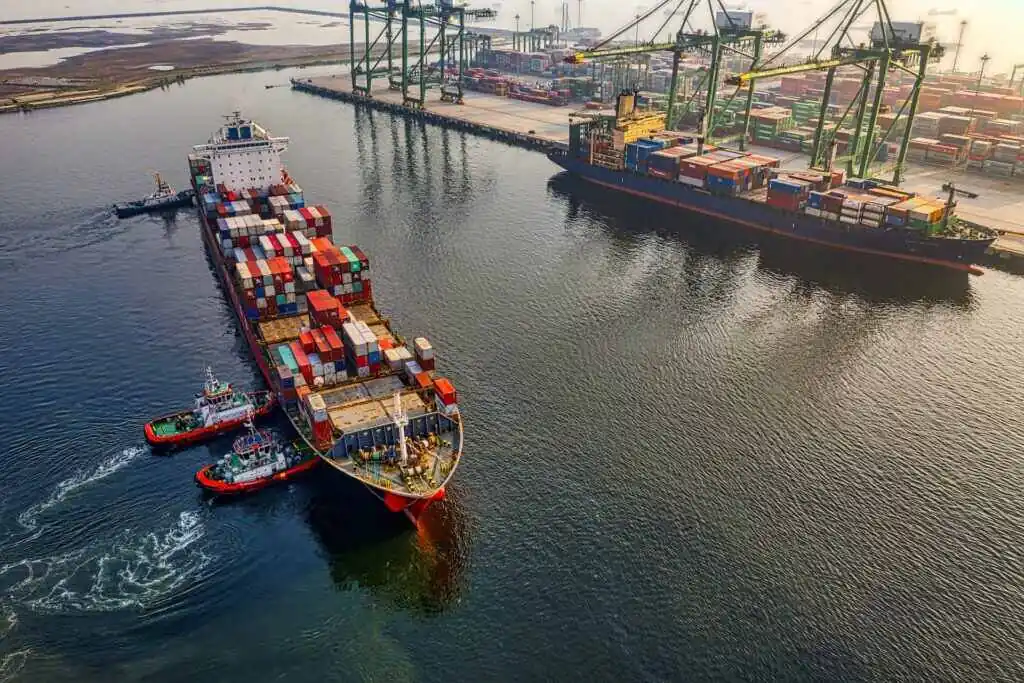Barge Accident Lawyers
Barges play a crucial role in the shipping industry, yet those working on these vessels face hazardous conditions that can lead to severe injuries. This risk extends not only to barge crew members, including captains, engineers, and deckhands but also to seamen on other towed vessels and even longshoremen and harbor workers involved in barge operations.
At Johnson Garcia, our Houston barge accident lawyers are dedicated to assisting maritime workers in securing the compensation they deserve for injuries incurred on the job. We advocate for victims of barge accidents in the Houston Ship Channel and other navigable waters across the United States. If you or someone close to you has been injured in a barge accident, reach out to our Houston maritime accident lawyers for a free consultation today.

Call us today at 832-844-6700 for a free case evaluation with an experienced Houston work injury lawyer.
What Is Considered a Barge?
A barge is a flat-bottomed vessel designed for transporting heavy goods through rivers and canals. Unlike many other types of vessels, barges typically do not have their own means of propulsion and must be towed or pushed by tugboats, although some barges are self-propelled. They are widely used for the transport of bulk items and raw materials due to their large carrying capacity and efficiency in moving goods over inland waterways.
Barges are versatile and can carry a variety of cargo, including dry goods like coal and grain, liquids like petroleum and chemicals, and even specialized cargo like heavy equipment and containers. Their design and use in shallow waters make them an essential component of maritime and inland waterway logistics networks.
What Types of Accidents Can Occur on Barges?
Barge operations, vital for transporting goods efficiently, come with inherent risks that can lead to various types of accidents, impacting the safety of maritime workers. Here are some common barge-related accidents:
- Collisions and Allisions. Barges can collide with other vessels or allide with stationary objects like bridges, docks, or riverbanks. These incidents can occur due to navigational errors, poor visibility, or adverse weather conditions, causing damage to the barge and injuries to the crew.
- Equipment Malfunctions. The failure of winches, cranes, or other loading equipment can result in accidents, including crushed limbs or other severe injuries to workers.
- Exposure to Hazardous Materials. Barges often transport chemicals, fuels, and other dangerous goods. Leaks or spills of these materials can pose health risks, including burns, poisoning, or respiratory issues, to workers on board.
- Slips, Trips, and Falls. Wet, slippery surfaces or obstacles on the deck can cause crew members to slip, trip, or fall, potentially leading to serious injuries. These accidents are common during loading and unloading operations or when the barge is in motion.
- Falling Overboard. Crew members can fall into the water during operations, leading to drowning or hypothermia.
- Fire and Explosions. The presence of flammable materials on barges can lead to fires or explosions, resulting in severe burns and other injuries.
- Mooring Accidents. Incorrectly securing a barge can lead to accidents during mooring operations, causing injuries from snapped lines or when barges drift unexpectedly.
- Confined Space Accidents. Working in the confined spaces of a barge, such as tanks or cargo holds, without proper ventilation or safety equipment can lead to suffocation, toxic exposure, or explosions.
Due to the inherent dangers of maritime environments and the heavy machinery involved, accidents on barges can be devastating and lead to catastrophic injuries. Ensuring the safety of barge operations requires strict adherence to safety protocols, proper maintenance of equipment, and comprehensive training for all crew members involved in barge operations.
What Are Common Causes of Barge Accidents and Injuries?
Navigating the vast and often treacherous waters of maritime work, barge workers face an array of risks each day. While the shipping industry is critical to our economy, the safety of those who brave its challenges is paramount. Unfortunately, negligence frequently plays a significant role in causing accidents and injuries on barges. From the bustling Houston Ship Channel to the expansive Gulf of Mexico, understanding these risks is the first step toward prevention and justice.
- Navigation Errors. These happen when crew members, due to inexperience or distraction, fail to accurately judge distances or miss crucial navigational signs. Such errors can lead to collisions that jeopardize the safety of everyone on board.
- Safety Failures. Skipping necessary safety steps or equipment not only puts workers at immediate risk but also shows a lack of concern for their long-term well-being.
- Equipment and Machinery Failures. Neglecting regular maintenance or opting for quick fixes can cause vital machinery to fail, disrupt operations, and potentially lead to severe injuries.
- Hazardous Conditions. Overlooking the correct handling and storage of dangerous materials can result in spills, fires, or explosions, posing immediate threats and causing environmental damage.
- Cargo Issues. Improperly loaded or overburdened barges are accidents waiting to happen, especially under challenging conditions, creating unsafe workspaces.
- Weather Negligence. Operating without regard for weather warnings or failing to secure the vessel properly can turn manageable situations into hazardous ones.
- Crewing Problems. Understaffed or inexperienced teams are more prone to make errors that compromise the safety and efficiency of maritime operations.
- Communication Breakdowns. Miscommunication, particularly in critical moments, can cascade into operational mishaps, endangering the crew and cargo.
Proving negligence in barge accidents hinges on dissecting the specifics: Did safety protocols fail? Were equipment malfunctions ignored? Was there a lapse in communication? These questions aren’t always easy to answer.
At Johnson Garcia, we dig into the evidence, from safety logs to witness statements, to demonstrate where and how negligence occurred. By focusing on the facts and leveraging our legal acumen, we make a complex process understandable and manageable for our clients. We are here to guide you through every step towards securing your rightful compensation.
How Is Compensation Covered in Barge Accidents?
When barge accidents occur, the legal framework for compensation is primarily determined by maritime law, including the Jones Act and the Longshore and Harbor Workers’ Compensation Act (LHWCA), alongside general U.S. maritime law. Here’s how these laws apply to barge accident compensation:
The Jones Act
The Jones Act specifically protects seamen working on vessels in navigation, including barges. Under this act, maritime workers injured due to their employer’s negligence are entitled to “maintenance and cure” benefits. “Maintenance” refers to daily living expenses during recovery, while “cure” covers medical expenses. Beyond these benefits, injured seamen can also seek full compensation for damages, including lost wages, pain and suffering, and more, if the injury resulted from employer negligence.
For actions under the Jones Act, seamen have a three-year statute of limitations from the accident date to file their lawsuit in either federal or state court. Failure to file within this period may result in the dismissal of the case as time-barred.
The Longshore Act
The LHWCA covers maritime workers not classified as “seamen,” such as those working in shipyard operations or on docks, making it highly relevant to many involved in barge operations. This act provides “no-fault” compensation, meaning workers can receive benefits without needing to prove employer negligence. It also allows for the pursuit of full compensation from negligent third parties involved in their injury.
Maritime Law
Beyond the protections offered by the Jones Act and the LHWCA, general maritime law also provides avenues for compensation, especially in cases of “unseaworthy” conditions—where a vessel’s unsafe condition leads to a worker’s injury. In such instances, the vessel’s owner may be held liable for the injured worker’s medical bills and other losses related to the injury.
Working on barges presents unique hazards, leading to a range of injuries. Compensation is not limited to physical harm but also covers mental health issues arising from accidents, acknowledging the comprehensive impact on a worker’s well-being. These are typical barge injuries eligible for compensation:
- Falls Leading to Traumatic Brain Injuries. Slips, trips, or falls on wet decks, uneven surfaces, or around obstacles can cause head injuries, including TBIs, underscoring the need for vigilance and proper safety measures.
- Crush Injuries and Amputations. Malfunctioning equipment or shifting cargo can result in severe crush injuries or even amputations, highlighting the dangers of equipment and cargo management.
- Drowning or Near-Drowning Events. Falling overboard or barge sinking incidents pose significant risks, leading to drowning or near-drowning situations, which are acutely relevant to barge work.
- Chemical Burns and Respiratory Issues. Fires, explosions, or hazardous chemical exposure can cause burns or respiratory problems, emphasizing the risks of handling dangerous materials.
- Fractures and Severe Lacerations. Heavy machinery accidents or mishaps during loading/unloading can lead to broken bones and deep cuts, typical of the heavy labor involved in barge operations.
- Repetitive Motion Injuries and Musculoskeletal Disorders. Continuous manual labor or machinery operation can result in conditions like tendonitis or carpal tunnel syndrome, reflecting the physical demands of barge work.
- Hearing Loss and Vibration Syndrome. Prolonged exposure to loud noise without protection and handling vibrating tools can cause hearing damage or hand-arm vibration syndrome, specific occupational hazards in this field.
- Mental Health Conditions. The psychological impact of accidents or the stressful environment can lead to anxiety, depression, or PTSD, acknowledging the mental toll of maritime accidents.
Compensation for these injuries includes not only medical expenses and rehabilitation costs but also compensation for lost wages, inability to work, and, in severe cases, wrongful death. It’s crucial to understand that recovering from such injuries might mean facing long-term or permanent changes to one’s quality of life and financial stability.
In the aftermath of a barge-related injury, Johnson Garcia can meticulously calculate the full extent of your losses and meticulously prepare a solid case for recovery. Our expertise in maritime law positions us to advocate effectively for the comprehensive compensation you deserve, covering both immediate and long-term needs.
How Can the Barge Accident Lawyers at Johnson Garcia Help?
At Johnson Garcia, our 35+ years of combined experience are dedicated to helping barge accident victims secure the compensation they need. We understand the challenges you face following an accident and believe no one should stress over bills or medical costs due to injuries they didn’t cause. Our experience allows us to offer tailored legal solutions, and we’re prepared to take your case to court if necessary to fight for your rights.
In your first meeting with us, we’ll dive deep into your case, review all relevant documents, and outline a clear legal strategy. We handle all dealings with insurance companies and are prepared to aggressively negotiate on your behalf. Our commitment is to accurately assess and recover just compensation that fully reflects the extent of your losses.
Related Pages
FREE CASE REVIEW
START YOUR JOURNEY TOWARDS JUSTICE
No Fee Unless We Win!
Johnson Garcia LLP
-
7324 Southwest Fwy, Suite
545 Houston, TX 77074 - 832-402-9332
- Available 24/7
FREE CASE REVIEW
START YOUR JOURNEY TOWARDS JUSTICE

